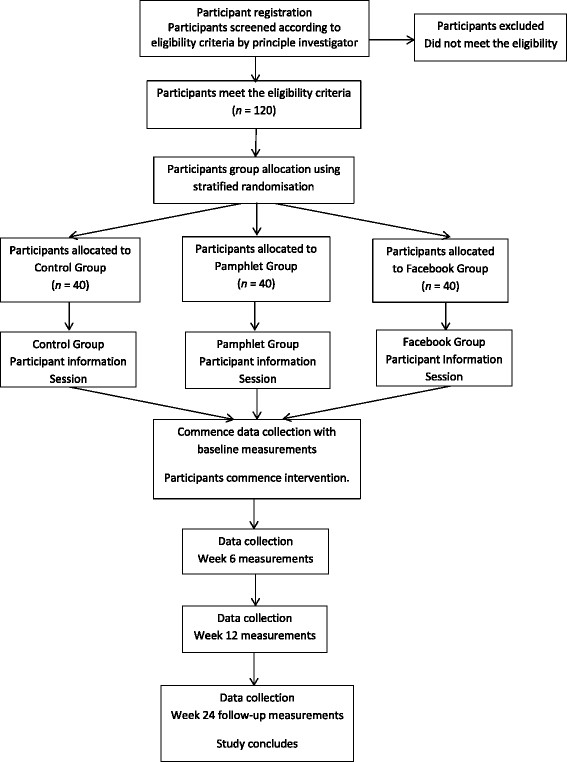Using new technologies to promote weight management: a randomised controlled trial study protocol
- PMID: 26012783
- PMCID: PMC4445522
- DOI: 10.1186/s12889-015-1849-4
Using new technologies to promote weight management: a randomised controlled trial study protocol
Abstract
Background: Over the last three decades, overweight and obesity and the associated health consequences have become global public health priorities. Methods that have been tried to address this problem have not had the desired impact, suggesting that other approaches need to be considered. One of the lessons learned throughout these attempts is that permanent weight loss requires sustained dietary and lifestyle changes, yet adherence to weight management programs has often been noted as one of the biggest challenges. This trial aims to address this issue by examining whether social media, as a potential health promotion tool, will improve adherence to a weight management program. To test the effectiveness of this measure, the designated program will be delivered via the popular social networking site Facebook, and compared to a standard delivery method that provides exactly the same content but which is communicated through a pamphlet. The trial will be conducted over a period of twelve weeks, with a twelve week follow-up. Although weight loss is expected, this study will specifically investigate the effectiveness of social media as a program delivery method. The program utilised will be one that has already been proven to achieve weight loss, namely The CSIRO Total Wellbeing Diet.
Methods/design: This project will be conducted as a 3-arm randomised controlled trial. One hundred and twenty participants will be recruited from the Perth community, and will be randomly assigned to one of the following three groups: the Facebook group, the pamphlet group, or a control group. The Facebook Group will receive the weight management program delivered via a closed group in Facebook, the Pamphlet Group will be given the same weight management program presented in a booklet, and the Control Group will follow the Australian Dietary Guidelines and the National Physical Activity Guidelines for Adults as usual care. Change in weight, body composition and waist circumference will be initial indicators of adherence to the program. Secondary outcome measures will be blood glucose, insulin, blood pressure, arterial stiffness, physical activity, eating behaviour, mental well-being (stress, anxiety, and depression), social support, self-control, self-efficacy, Facebook activity, and program evaluation.
Discussion: It is expected that this trial will support the use of social media - a source of social support and information sharing - as a delivery method for weight management programs, enhancing the reduction in weight expected from dietary and physical activity changes. Facebook is a popular, easy to access and cost-effective online platform that can be used to assist the formation of social groups, and could be translated into health promotion practice relatively easily. It is anticipated in the context of the predicted findings that social media will provide an invaluable resource for health professionals and patients alike.
Trial registration: Australian New Zealand Clinical Trials Register (ANZCTR): ACTRN12614000536662. Date registered: 21 May 2014.
Similar articles
-
Effects of a weight management program delivered by social media on weight and metabolic syndrome risk factors in overweight and obese adults: A randomised controlled trial.PLoS One. 2017 Jun 2;12(6):e0178326. doi: 10.1371/journal.pone.0178326. eCollection 2017. PLoS One. 2017. PMID: 28575048 Free PMC article. Clinical Trial.
-
Online platform for healthy weight loss in adults with overweight and obesity - the "POEmaS" project: a randomized controlled trial.BMC Public Health. 2018 Aug 1;18(1):945. doi: 10.1186/s12889-018-5882-y. BMC Public Health. 2018. PMID: 30068393 Free PMC article.
-
"Active Team" a social and gamified app-based physical activity intervention: randomised controlled trial study protocol.BMC Public Health. 2017 Nov 2;17(1):859. doi: 10.1186/s12889-017-4882-7. BMC Public Health. 2017. PMID: 29096614 Free PMC article. Clinical Trial.
-
Social Media and Obesity in Adults: a Review of Recent Research and Future Directions.Curr Diab Rep. 2018 Apr 18;18(6):34. doi: 10.1007/s11892-018-1001-9. Curr Diab Rep. 2018. PMID: 29671135 Review.
-
The effect of social media interventions on physical activity and dietary behaviours in young people and adults: a systematic review.Int J Behav Nutr Phys Act. 2021 Jun 5;18(1):72. doi: 10.1186/s12966-021-01138-3. Int J Behav Nutr Phys Act. 2021. PMID: 34090469 Free PMC article.
Cited by
-
Identifying Factors Contributing to Dropouts in a Pilot Telenutrition Weight-Loss Program: A Qualitative Study.Telemed Rep. 2024 Dec 11;5(1):393-401. doi: 10.1089/tmr.2024.0071. eCollection 2024. Telemed Rep. 2024. PMID: 39735289 Free PMC article.
-
Retrofit Weight-Loss Outcomes at 6, 12, and 24 Months and Characteristics of 12-Month High Performers: A Retrospective Analysis.JMIR Mhealth Uhealth. 2016 Aug 22;4(3):e101. doi: 10.2196/mhealth.5873. JMIR Mhealth Uhealth. 2016. PMID: 27549134 Free PMC article.
-
Twitter-Delivered Behavioral Weight-Loss Interventions: A Pilot Series.JMIR Res Protoc. 2015 Oct 23;4(4):e123. doi: 10.2196/resprot.4864. JMIR Res Protoc. 2015. PMID: 26500186 Free PMC article.
-
Behavioural interventions delivered through interactive social media for health behaviour change, health outcomes, and health equity in the adult population.Cochrane Database Syst Rev. 2021 May 31;5(5):CD012932. doi: 10.1002/14651858.CD012932.pub2. Cochrane Database Syst Rev. 2021. PMID: 34057201 Free PMC article.
-
Social media for health promotion and weight management: a critical debate.BMC Public Health. 2018 Jul 28;18(1):932. doi: 10.1186/s12889-018-5837-3. BMC Public Health. 2018. PMID: 30055592 Free PMC article.
References
Publication types
MeSH terms
Associated data
LinkOut - more resources
Full Text Sources
Other Literature Sources
Medical


